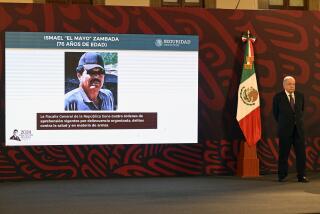List Raises Questions of a Free Press
- Share via
MEXICO CITY — It reads like a who’s who of media figures in Mexico. Newspaper reporters. TV interviewers. Powerful columnists. Foreign correspondents.
But the list that has roiled political and journalistic circles here isn’t for a glittering party or a magazine article. The dossier, with information about each reporter or commentator, was compiled by the military, according to an online news service that recently published the documents. The secret files are raising questions about how much the military accepts democratic reform and a free press.
“If it’s just intelligence information, I’m not afraid. But if it’s used to block reporters’ work, harass, or limit access to information or places to certain journalists, it seems very bad,” said Pedro Armendares, head of the Mexican professional group Investigative Journalists.
The files were compiled by the military after the 1994 uprising by the leftist Zapatista rebels in Chiapas state, according to To2, the online news service that revealed the documents.
The military rapidly won the armed confrontation with the rebels. But, according to To2, the army realized it was outflanked on the public relations front by the Zapatistas and their charismatic, Internet-friendly leader, known as Subcommander Marcos.
As part of an effort to address critical media coverage, the military created files on more than 200 Mexican reporters and columnists, including leading intellectuals, opposition politicians and foreign correspondents, according to To2.
“We know that journalists will always be observed. This happens in any government agency or any country,” said Hilda Garcia, a respected journalist and editorial director of To2. “What seems unusual is that the army was doing this as a strategy of war. When the conflict started in Chiapas, that’s when the army acted.”
The military has denied that the files exist, the news service says. But the Spanish-language Web site, https://www.to2.com.mx, has posted 70 of the military files it says were obtained from a source. Each has the name of a reporter or columnist, their organization and a description of whether their coverage of the army is viewed as positive, negative or critical.
Many are brief, straightforward biographies; others are laced with errors and gossip, and reflect the military’s deep suspicion about reports that differ from its version of events.
For example, the file on Juanita Darling, now The Times’ Central America correspondent, says that her coverage of the military was negative and that she had “contributed to generating a positive atmosphere abroad for Amado Avendano, Samuel Ruiz and Ofelia Medina”--respectively, a Mexican politician, bishop and actress who supported the Zapatistas.
There is no indication that the military took any action against reporters whose coverage was deemed negative.
Political scientists say the documents reflect the army’s difficulty in facing criticism after a long history of secrecy. Traditionally, politicians have let the military run its own affairs in exchange for an unspoken pledge that it would not launch coups. For their part, journalists have rarely written critically of the military. Some reporters feared the army; others saw it as a symbol of patriotism.
“The Mexican tradition was to not touch the army or the Virgin,” said Lorenzo Meyer, a political scientist, referring to the Virgin of Guadalupe, a revered figure here. The army’s unpopular campaign in Chiapas “made it impossible to follow this unwritten rule.”
The tradition of military secrecy largely continues, even as the government and media have been transformed by the advent of multi-party democracy. Repeated calls to the Defense Ministry seeking comment for this article were not returned.
But the relationship between the media and military seems to have changed. Garcia, the To2 editor, said many journalists considered it a badge of honor to see themselves listed as critics of the army. Armendares, of the investigative reporters’ group, agreed.
“There are many journalists who are very offended because they didn’t appear on that list,” he said.
More to Read
Sign up for Essential California
The most important California stories and recommendations in your inbox every morning.
You may occasionally receive promotional content from the Los Angeles Times.













